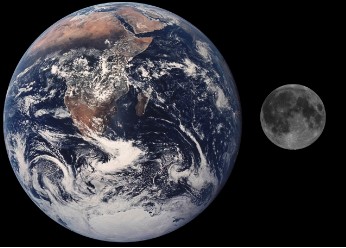英语听力文摘 English Digest 477、地球为什么是圆的?
时间:2019-01-26 作者:英语课 分类:英语听力文摘 English Digest
地球是太阳系从内到外的第三颗行星,也是太阳系中直径、质量和密度最大的类地行星。它也经常被称作世界。英语的地球Earth一词来自于古英语及日耳曼语。地球已有44~46亿岁,有一颗天然卫星月球围绕着地球以27.32天的周期旋转,而地球以近24小时的周期自转并且以一年的周期绕太阳公转。迪士尼有同名纪录片。
Why the Earth Is Round
地球为什么是圆的?
Our never-thought to ask question for today is: Why is the earth round? Why not a cube? A cube? No,that's silly. Is it? Why?
Because…,because really big things like to be round for some reason. Exactly right.And that reason is gravity.
Think of it this way. Suppose the earth were a cube. Then some points on its surface would be farther 1 away from the center than others. The corners, for example, would be much farther out than the rest.
Since gravity works equally on everything, there would be a tendency to pull those uneven places down. The surface would even itself out. The only geometrical object in which every point on the surface is the same distance from the center is a sphere.
But wait a minute,I've seen pictures of asteroids 3 that have all sorts of crazy shapes.Why aren't they round?
Only because they aren’t big enough for gravity to be a determining factor. If an asteroid 2 were to suddenly become as big as a moon, it would indeed rearrange itself gradually into a sphere.

今天,我们“从未想过的问题”是:地球为什么是圆的?为什么不是方形的?方形?那太可笑了。是吗?为什么?
因为……因为非常大的东西通常都是圆的。完全正确。这个原因就是重力。
我们这样想,假设地球是一个立方体。而地球表面的某些端点离中间或其它端点比较远。比如,立方体的各个角离得很远。
由于重力对所有物质的作用是相等的,因此不均匀的地方会被向下拉。表面使其本身变得平均。唯一一个表面上的每个角
到中心距离都相等的几何物体就是球体。
等一下,我看过很多行星的图片,它们都是奇形怪状的。它们为什么不是圆的?
那只是因为行星太小,重力不能成为其决定因素。如果行星突然变得和月亮一样大,它就会真正重新安排逐渐变成一个球体。
- I can throw the ball farther than you can.这个球我能比你扔得远。
- The farther hill is five kilometres away.那座更远的小山在五公里以外。
- Astronomers have yet to witness an asteroid impact with another planet.天文学家还没有目击过小行星撞击其它行星。
- It's very unlikely that an asteroid will crash into Earth but the danger exists.小行星撞地球的可能性很小,但这样的危险还是存在的。